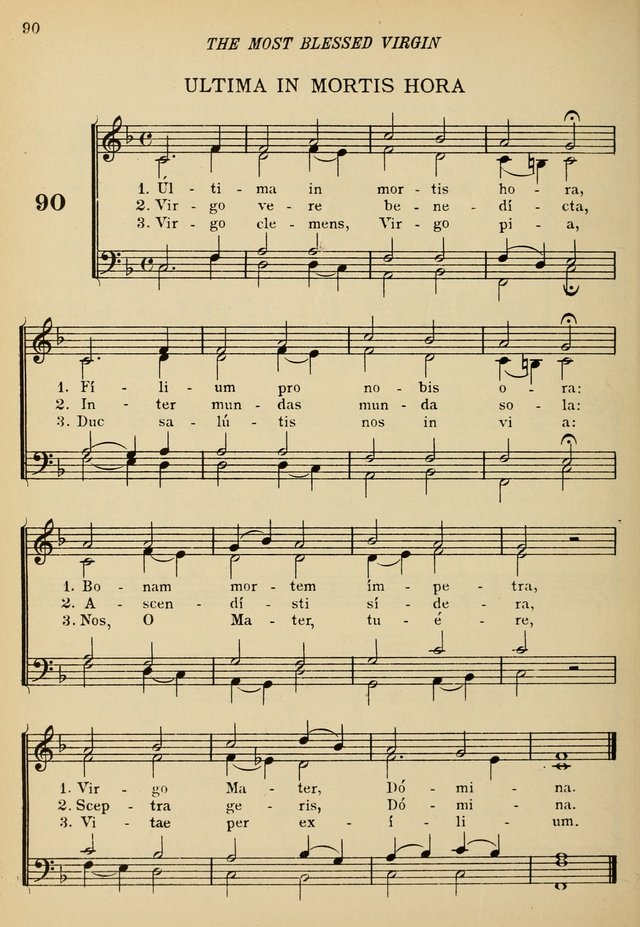 From a reader…
From a reader…
QUAERITUR:
When my father died, about 11 years ago, the priest who offered his funeral Mass ended it by chanting what he called “the Ultima”. The priest who did it is a very good friend of mine, and this is the only instance I’ve ever heard him chant in Latin during a Mass. I had never heard of this chant before my father’s funeral and I haven’t heard it since.
Over the years I would try to research this chant to find information on it but have not had any sucess till recently. I found the words and notation on a website along with a translation that was done in 2006 but I still don’t know much about the chants use or history.
My priest friend has not been helpful. He is usually the type to scoff at all things traditional, which is why I was shocked at his chanting latin at my father’s funeral. Would you be able to shed some light on this for me, please?
Thank you for all your hard work at this blog. You are in my prayers.
The chant in question is called “The Ultima”, from the more complete “Ultima in hora mortis”.
This is something from the Benedictine tradition. It is a chant, to the Blessed Virgin, invoking her as a good Mother and Queen of Heaven, to help souls to a good death and to take care of them afterward.
You can find it online, for example, HERE.

The American Cassinese Benedictines have a version, which includes three languages. HERE [UPDATED link: to their new server… help them out and CLICK!]
The text seems to be cobbled up from lines taken from a sequence written by a Cardinal Archbishop of Cologne at the time of Pius IX’s proclamation of the dogma of the Immaculate Conception. Hence, it is not an ancient text, but it reflects the piety and faith of millennia of Christian experience of Mary and of death.
Usually the first part is sung, and it has been set for four voices, etc.
Ultima in mortis hora
Filium pro nobis ora
Bonam mortem impetra
Virgo, Mater Domina
Literally:
In the last hour/moment of death
pray to Your Son for us
obtain (for us) a good death
O Virgin, Mother Lady.
We should contemplate death often and pray for a good death.
Last night I blessed Epiphany Water, which rite includes the Litany of Saints, during which we pray to be saved from a sudden and unprovided death, that is, death with the the sacraments, the chance to make a good confession.
Baring extraordinary graces, I think people die as they have lived. Habits get baked into over the years. We have to develop habits of dying while we are still living, so that when we die, we die as well as possible. Death is a great mystery, but we can ready ourselves, much as soldiers – and we belong to the Church Militant – ready for the struggle through constant and long drills.


































I learned it at the Franciscan high school seminary whose version can be heard here:
http://www.franciscan-alumni.org/assets/Music/First-Album/Ultima.mp3
We sang in the verses in Latin, English and German:
When our day of life is ending
Mary, with thy Son attending
Lead us home to thee we call
Virgin, Mother, Queen of all
Wenn wir mit der Tod’s Angst ringen
Wollst Marai uns beispringen
Dass wir selig scheiden hin
Jungfrau, Mutter , Koenigin
Check out YouTube…. there are a number of posts of the Ultima sung as a solo, with the same notation on this site (SATB) and even one with Yo-Yo Ma!
Thank you for this Father. It is a lovely hymn. I was thinking of that chant which is sung after the requiem and, I believe, that it should be sung at the internment of the Body:-
“In Paradisum deducant te angeli
in tuo adventu suscipiant te Martyres,
et perducant te in civitatem sanctam Jerusalem
Angelorum te suscipiat, et cum Lazaro quondam paupere aeternam habeas requiem.
I think about death quite often. I am not a young man.
The franciscan friars of the renewal sang it around the death bed of fr apostoli as it was one of his favorite hymns….
The Franciscan friars here in New Mexico also sing the Ultima. The Province of Our Lady of Guadalupe was originally part of the Cincinnati Province and the majority of the Franciscans were German. At funerals for Franciscans, I’ve heard the Ultima sung in Latin, German, and sometimes even in Navajo. The Franciscans did some amazing work on the Navajo Reservation. Happily, there are still some doing amazing work on the Reservation. But I’m afraid the numbers just simply aren’t what they were.
The Franciscan religious community I was in for several years had a version of this, with the Latin Ultima verse being the first and last verse, and three German verses in between, the first being the German one the Benedictines use, and then two others which I could sing but won’t venture to guess how to write. It had almost a lullaby quality to it, and we sang it at night prayer. It remains one of my very favorite hymns.
In my Province of the Capuchins at least, we have the beautiful tradition of singing at the burial of our friars.
I love the Ultima. The monks at St. Benedict’s Abbey sing this at every graveside service for a deceased monk. The priest who had my Dad’s funeral also sang it with the other monk that was there at my father’s grave at the end of the funeral rites. I tried to sing it with them, but my emotions got the better of me and I couldn’t finish. Here is a video of some of the younger monks of that community singing this at some kind of a college gathering at Benedictine College (I am a classmate of Abbot James–the one with the pectoral cross). The singing starts about half-way through: https://www.youtube.com/watch?v=KOKuj1cM_CU
I stumbled upon this on Sunday flipping through the New Basil Hymnal, which a number of TLM communities use.